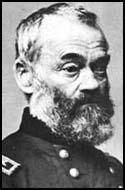Samuel Heintzelman

Samuel Heintzelman was born in Pennsylvania in 1805. He served in the Seminole War and the Mexican War and in 1861 had reached the rank of colonel.
On the outbreak of the American Civil War Heintzelman joined the Union Army. He was wounded at Bull Run (July, 1861) but recovered to join the Army of the Potomac. During the Peninsular campaign he commanded the III Corps. In May, 1862, Heintzelman was promoted to the rank of major general and placed in command of the Military District of Washington.
After the war Heintzelman remained in the army until retiring in 1869. Samuel Heintzelman died in 1880.
Primary Sources
(1) In his autobiography Oliver Howard described fighting at Bull Run on 21st July, 1861.
I saw Burnside's men, who had come back from the field with their muskets gleaming in the sunshine. They had some appearance of formation and were resting on their arms. I noticed other troops more scattered; ambulances in long columns leaving the field with the wounded. There were men with broken arms; faces with bandages stained with blood; bodies pierced; many were walking or limping to the rear; meanwhile shells were shrieking and breaking in the heated air. I was sorry, indeed, that those left of my men had to pass that ordeal.
When forming, I so stationed myself, mounted, that the men, marching in twos, should pass me. I closely observed them. They were pale and thoughtful. Many looked up into my face and smiled. As soon as it was ready the first line swept up the slope, through a sprinkling of trees, out into an open space on high ground. An enemy's battery toward our front and some musketry shots with no enemy plainly in sight caused the first annoyance. Soon another battery off to our right coming into position increased the danger. And, worse than the batteries, showers of musket balls from the wood, two hundred yards away.
Many officers labored to keep their men together, but I saw could effect nothing under fire. At last I ordered all to fall back to the valley and reform behind the thicket. Before many minutes, however, it was evident that a panic had seized all the troops within sight. Some experienced veteran officers, like Heintzelman, entreated and commanded their subordinates, by turns, to rally their men; but nothing could stop the drift and eddies of the masses that were faster and faster flowing toward the rear.
Captain Heath, of the Third Maine, who, promoted subsequently to lieutenant colonel and fell in the battle of Gaines Mills, walked for some time by my horse and shed tears as he talked to me: "My men will not stay together, Colonel, they will not obey me," he said. Other brave officers pleaded and threatened. Surgeons staying back pointed to their wounded and cried: "for God's sake, stop; don't leave us!" Nothing could at that time reach and influence the fleeing crowds except panicky cries like: "The enemy is upon us! We shall be taken!" These cries gave increase to confusion and speed to flight.
Heintzelman, with his wounded arm in a sling, rode up and down and made a last effort to restore order. He sharply reprimanded every officer he encountered. He swore at me. From time to time I renewed my attempts. My brother, C. H. Howard, if he saw me relax for a moment, sang out: "Oh, do try again!" Part of the Fourteenth New York from Brooklyn rallied north of Bull Run and were moving on in fine shape. "See them," said my brother; "let us try to form like that!" So we were trying, gathering a few, but in vain. Then I stopped all efforts, but sent out this message and kept repeating it to every Maine and Vermont man within reach: "To the old camp at Centreville. Rally at the Centreville camp."

